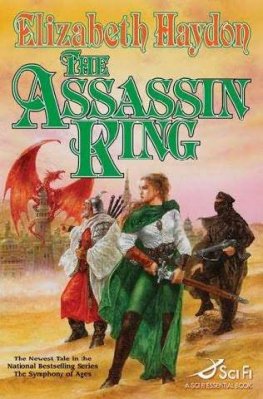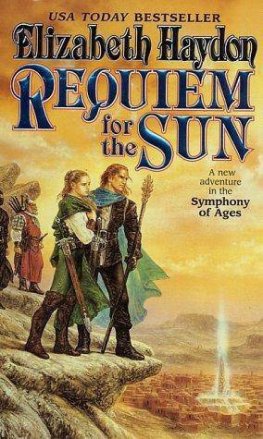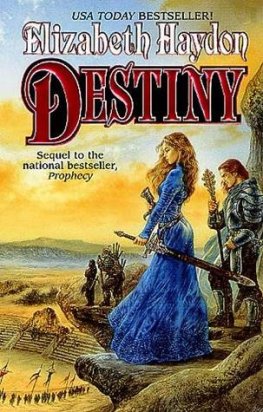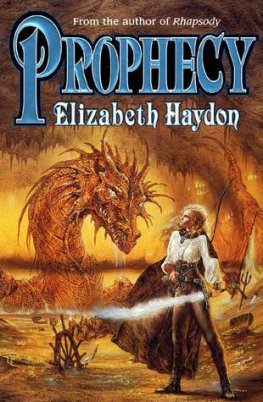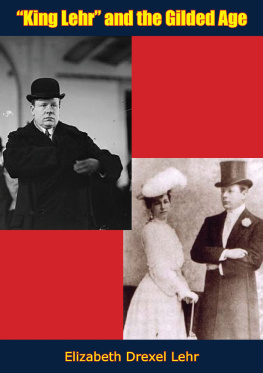Elizabeth Haydon - The Assassin King
Here you can read online Elizabeth Haydon - The Assassin King full text of the book (entire story) in english for free. Download pdf and epub, get meaning, cover and reviews about this ebook. year: 2005, genre: Romance novel. Description of the work, (preface) as well as reviews are available. Best literature library LitArk.com created for fans of good reading and offers a wide selection of genres:
Romance novel
Science fiction
Adventure
Detective
Science
History
Home and family
Prose
Art
Politics
Computer
Non-fiction
Religion
Business
Children
Humor
Choose a favorite category and find really read worthwhile books. Enjoy immersion in the world of imagination, feel the emotions of the characters or learn something new for yourself, make an fascinating discovery.
- Book:The Assassin King
- Author:
- Genre:
- Year:2005
- Rating:4 / 5
- Favourites:Add to favourites
- Your mark:
- 80
- 1
- 2
- 3
- 4
- 5
The Assassin King: summary, description and annotation
We offer to read an annotation, description, summary or preface (depends on what the author of the book "The Assassin King" wrote himself). If you haven't found the necessary information about the book — write in the comments, we will try to find it.
The Assassin King — read online for free the complete book (whole text) full work
Below is the text of the book, divided by pages. System saving the place of the last page read, allows you to conveniently read the book "The Assassin King" online for free, without having to search again every time where you left off. Put a bookmark, and you can go to the page where you finished reading at any time.
Font size:
Interval:
Bookmark:
Elizabeth Haydon
The Assassin King
Ode
We are the music-makers,
And we are the dreamers of dreams,
Wandering by lone sea-breakers,
And sitting by desolate streams;
World-losers and world-forsakers,
On whom the pale moon gleams:
Yet we are the movers and shakers
Of the world for ever, it seems.
With wonderful deathless ditties
We build up the worlds great cities,
And out of a fabulous story
We fashion an empires glory:
One man with a dream, at pleasure,
Shall go forth and conquer a crown;
And three with a new songs measure
Can trample an empire down.
We, in the ages lying
In the buried past of the earth,
Built Nineveh with our sighing,
And Babel itself with our mirth;
And oerthrew them with prophesying
To the old of the new worlds worth;
For each age is a dream that is dying,
Or one that is coming to birth.
The Poem of Seven
Seven Gifts of the Creator,
Seven colors of light,
Seven seas in the wide world,
Seven days in a sennight,
Seven months of fallow,
Seven continents trod, weave
Seven eras of history
In the eye of God.
Song of the Sky Loom
Oh, our Mother the Earth;
Oh, our Father the Sky,
Your children are we,
With tired backs.
We bring you the gifts you love.
Then weave for us a garment of brightness
May the warp be the white light of morning,
May the weft be the red light of evening,
May the fringes be the fallen rain,
May the border be the standing rainbow.
Thus weave for us a garment of brightness
That we may walk fittingly where birds sing;
That we may walk fittingly where the grass is green.
Oh, our Mother Earth;
Oh, our Father Sky.
The Weavers Lament
Time, it is a tapestry
Threads that weave it number three
These be known, from first to last,
Future, Present, and the Past.
Present, Future, weft-thread be
Fleeting in inconstancy
Yet the colors they do add
Serve to make the heart be glad.
Past, the warp-thread that it be,
Sets the path of history
Every moment neath the sun
Every battle, lost or won,
Finds its place within the lee
Of Times enduring memory.
Fate, the weaver of the bands,
Holds these threads within Her hands,
Plaits a rope that in its use
Can be a lifeline, netor noose
1
On a morning of unsurpassed fineness, the sun rose over an incandescent sea, rippling with light so bright as to be painful in its radiance. The winter wind dancing over the gleaming waves, fresh with the sweet hint of a spring coming far away in the southlands, carried with it the scent of blood. Rath cursed and lowered his head to his chest, pulling bis brown hood farther down over his stinging eyes. He waited for the water beneath his translucent eyelids to clear, then blinked several times and looked up again at the shoreline. The sea was so calm that the edge of the land barely wavered in the distance. Rath clutched the oar in his sinewy hands and put his back into rowing for the beach. With each stroke, each pull, each screech of wood against the oarlock of his small boat, he canted his list of targets, every one of their names engraved permanently on his memory. Hrarfa, Fraax, Sistha, Hnaf, Ficken, he whispered in the odd, buzzlike language of his ancient race, the one form of speech that was inaudible to the wind. Rath was always careful not to put information on the wind, especially the sea wind, where it would blow recklessly about the wide world, to be heard by any ear that knew how to listen. Rath was well aware of the loose tongue of the wind; he had been born of that ephemeral element. He gritted his teeth as he rowed, mentally cursing the waves over which he traveled. Water had long blocked his Seeking vibration and kept him from his quarry. Each stroke moved him closer to being free of it, but that did little to calm his growing ire. Until he was away from the sea and the cacophony of thick vibrations that it generated, he would be unable to hunt. So he concentrated, as always, on his list. Hrarfa, Fraax, Sistha, Hnaf, Ficken. Once through the roster of would-be victims that had been his agenda for as long as he could recall, he silently intoned one last name that had been recently added. Ysk. It was not a name in the language of the others, but rather one that had been conferred on its owner by an ignorant species, a demi-human race that barely formed words at all. Ysk was the Firbolg word for spittle, for the regurgitation of something foul. That monsters had given someone such a title could only convey the deepest disgust, contempt that had no limit. It was perhaps the worst name that Rath had ever heard. It was also a dead name, a name whose power had been broken more than a millennium before, whose history lay at the bottom of the sea on the other side of the world. A name all but forgotten, indeed, completely erased from the wind and from memory, except for the recollection of Rath and his kind. It was the last name on his list, but the first one he would actively seek upon landing. When the beach was finally close enough that rowing was disproportionate effort, Rath climbed out of the boat and left it drifting in the tide. He had sighted his landing carefully so as to be able to come ashore unnoticed in a small, rocky alcove be-tween two fishing villages. His luck was holding; there was no one in sight for as far up and down the beach as he could see. He turned away from the sea wind with one last glance over his shoulder; the little boat was slowly backing away in a graceless dance, spinning aimlessly in the current. Rath waded to shore, ignoring the pebbles and seaweed that coated the sand beneath his feet. His soles had no nerves in them anyway, the calluses from millennia of walking through fire were almost as thick as a boot would have been. Once on the beach, he hurried forward until the scrambling froth of the waves was no longer able to reach him, then stopped in the cold, dry sand, pulled back his hood, and tilted his head to the southwest, listening to the wind. He waited for the span of a hundred heartbeats, but no voices akin to his own could be heard; none of his fellow hunters had anything to report, as was the case most of the time. As it had been for centuries into millennia. Rath lingered a moment longer, then turned his back to the west, away from the crashing of the waves and the rustling of the foam. He took a breath of the salt wind, inhaling over the four openings of his windpipe, clenched his teeth, and loosed his kirai, the Seeking vibration by which his race sought then-prey. The buzzing sound came forth from the deepest opening in his throat, a vibration heard only by him. Then he opened his mouth, allowing the air that was rising from within his lungs to pass over the top opening in his throat, forming words again. Hrarfa, Fraax, Sistha, Hnaf, Ficken. One by one he canted the names of the demon spirits he was hunting, feeling the slight variation in tone as he changed from one name to another. If the kirai matched any of those names to a vibration it detected in the air, his throat would burn as if with caustic fire; he would taste the beasts blood in his mouth, feel its heartbeat in his own chest. He could lock on to that rhythm and follow it. But, as always, there was no taste of any of the names on the wind. Finally, he intoned the last name. Ysk. This name, of course, was different. Unlike the others, it was the dead name of a living being, a name once given, in another lifetime, to a man with a soul. However tainted that soul might be by the ravages of time and personal failure, it could never be as acidly evil as the essence of the demonic beings Rath and his fellow demon hunters regularly pursued. And however dead the name might be, Rath had reason to believe its original owner was, in fact, still alive, though his vibrational signature had changed along with his name. And not long before, he had heard the dead name, spoken aloud, on the nattering wind. He hoped to get a taste of it once more, now that he had crossed the sea and finally come ashore in the place to which he had tracked the name, the place it seemed to have been last spoken. He inhaled, letting the wind pass over his tongue, then canted the name. Ysk. There was a remnant of it still on the wind coming from the southeast, though faint and hollow; perhaps it had been years since it had been voiced. Still, this continent, this place known in old lore as the Wyrmlands, was the place where the name had last been sounded. Rath could taste that much. Satisfied, he stripped his pack from beneath his cloak, opening it carefully on the sandy ground as the wind whipped off the sea, buffeting the skin of his naked head. He quickly checked his provisions and the minimal tools of his trade, as well as the dagger he wore in a calf sheath. The weapon was little more than a childs knife, meant only for the meanest of self-defense against any beast or man that he might not be able to otherwise avoid. No one who observed him would consider him armed. Rath carried his deadliest weapons in his head. Determining his water supply to be sufficient, he quickly repacked his provisions and slung the pack beneath his flowing brown cloak. Then he glanced at the sea one last time; the little boat was no longer in sight, lost in the blazing glare of the rising sun. A moment later, to any eye other than his own, so was Rath.
Font size:
Interval:
Bookmark:
Similar books «The Assassin King»
Look at similar books to The Assassin King. We have selected literature similar in name and meaning in the hope of providing readers with more options to find new, interesting, not yet read works.
Discussion, reviews of the book The Assassin King and just readers' own opinions. Leave your comments, write what you think about the work, its meaning or the main characters. Specify what exactly you liked and what you didn't like, and why you think so.

